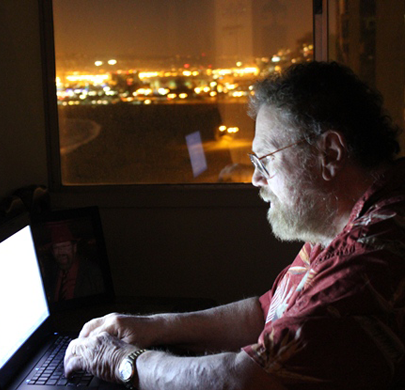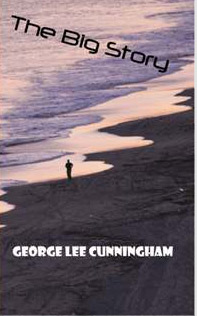FEATURED POSTS
-
March 14, 2017
WALKING WITH GHOSTS: PART TWO

ALL IT NEEDS IS A LITTLE TENDER LOVING CARE
There are ghosts along the backroads of America – the two-lane blacktops that used to be major highways until they were replaced by today’s broad and busy Interstate speedways. Some of the towns struggle on – gas stations and mini-marts, a Dairy Queen and a coffee shop, gravel parking lots littered with cigarette butts and gum wrappers. But many of the homes along the highway stand empty, year-by-year falling apart in slow motion, the porches sagging and the windows broken out.
You see them and you wonder what the story is. Were they once happy places, full of laughter and love, rural outposts of a kinder and gentler time? That’s what I like to think. But just as likely they were houses of dysfunction, occupied by angry and bitter people, stuck in the backwoods of society, too afraid of the unknown to join the migration of their friends and families to the city. And when they died or finally had to move on, the house they left behind slowly rotted away in place.
There is a mystery and a story behind every such place.
I find myself fascinated by these rural ruins, drawn to them both for their isolation from the main stream and by the lonely and sad mystery of their rise and their fall. Nobody builds a house anticipating that it will one day fall into ruin and be a rotting and weed-infested husk. And I like the vast emptiness surrounding many such structures, often miles of desert or open fields, hills in the distance, mountains behind the hills, the sky above and the gravel and dirt below.
It is not a fascination shared by my spouse.
“You know,” I say to her, one day driving through the desert, “we probably could get one of these old houses dirt cheap, fix it up, prop up the roof, new planking for the front porch, and live out here under the open sky.”
Silence.
There are times that I know better, that I can feel the tension in the way she sits and see it in her face. She is not amused by the idea, mostly because she knows that even though it’s just talk, part of me wouldn’t mind doing just that.
I continue undaunted.
“You wake up in the morning, you walk out to the front porch, and you can see for miles. No neighbors crowding in on every side, no horns honking or freeway noise, just birds singing and the wind blowing across the plain.”
Her jaws clamped tight. Eyes locked on the road ahead. Silence.
“So what do you think, honey?” I ask, knowing exactly what she thinks, but for some odd reason still wanting to stir things up, to get a reaction. By this time, the silence is killing me. She could say, well I disagree. She could say, the desert is lovely this time of year, but I don’t think I would like to live here in the summer. She could even just tell me to go straight to H-E-double hockey sticks.
But the silence is a killer, and she knows it.
“Honey,” I finally say. “Do you want to talk about it?”
“Go ahead,” she snaps back. “You want to live out here in the middle of nowhere, go ahead. But you’re going to be greeting the morning sky and the birds and the flies and the rattlesnakes by yourself, because the dog and I are going to be living someplace else.”
“I didn’t say we should move out here, I just was thinking what if we did?”
“Good, I think you should,” she says. “You only have to drive 35 or 40 miles to get a loaf of bread and a quart of milk, and then you’re going to pay about three times the price that you would at the supermarket in the city. But hey, you love the wide open spaces, so that’s not a problem.
“Just don’t expect the dog and me to live out here with you…”
“Maybe the dog would like it out here,” I joke, trying to relieve some of the tension.
“The dog stays with me.”
“OK honey,” I finally relent. “I think we should cross this off our list.”
Silence for several more miles.
“You’re not funny,” she finally says. “You think you’re being funny, but you’re not.”
“No Ma’am,” I say. “Not funny.”
And now I know – another mystery solved. Why there are houses abandoned out in the middle of nowhere. Because wives don’t like living out in the middle of nowhere.
And men don’t like cooking for themselves.
– George Lee Cunningham
Do you have a dissenting opinion or any opinion at all on the subject? Contact me at george@georgeleecunningham.com and let me know. Meanwhile, you can always subscribe and get an email reminder of blog postings. Your name will not be shared and you may cancel at any time.
-
When Language Goes Bad, We All Lose
I don’t mean to be an old grump, but I have made my living for many years as a salesman of words so I think language is important. Language is more than how we communicate. It’s also how we think. We think in language, and if we don’t have proper language skills, our thinking is impaired.

THE AGE OF COLLABORATION
I strongly believe this, but at the same time I know that part of my distress is merely that language keeps changing and I don’t like it.
Gay used to mean happy. There was a time that you could be gay, and still be attracted to girls. Now, not so much.
Gender used to be a grammar term. Words – especially in foreign languages – had gender. People, on the other hand, were distinguished by their sex – male or female.
Discrimination used to be a good word. A man of discriminating taste meant one who appreciated the finer things in life, one who recognized the difference between something of greater and lesser quality.
Collaboration was something cowardly and selfish people did with the enemy. They were collaborators, which meant they befriended and worked with the other side.
Today, collaboration is something we’re all encouraged to do. We sit around in endless meetings collaborating with each other and watering down any new idea that comes along until it becomes mush and is finally acceptable to everybody.
In fact the words have not really changed. It’s how people perceive the words that has changed.
I can still be gay, meaning feeling happy and carefree, and still like girls. But now the meaning of the word has become confused. I have also meet and been friends with queer people, meaning they were a little quirky, no matter what their sexual preference might have been.
Being a cranky dinosaur I will sometimes scratch out gender on written forms and substitute the word sex before putting down male. I do make a distinction – meaning I discriminate – between people I like and admire and people that I don’t. Sometimes those people are Caucasians and sometimes they are not.
I even collaborate, although I admit that I am not very good at it. Even with people I admire and like, my lack of enthusiasm sometimes comes across as a bit stand-offish and disagreeable.
I’m OK with that.
– George Lee Cunningham
-
Lyrics, Poetry and Prose IV
A place to share some words of beauty, inspiration, and fun. This week we are sharing some of our favorite versions of well-known songs. Click on the name of the piece to get a video or more information. You have some favorites? Please share…
Someday, I wish upon a star
Wake up where the clouds are far behind me
Where trouble melts like lemon drops
High above the chimney top
That’s where you’ll find me– Over the Rainbow & What a Wonderful World Israel Kamakawiwo’ole
Do you remember the night we met
That’s the night I knew you were my pet
I want to tell you how much I love you
But I’m drowning in the sea of love– Sea of Love Singer Tom Waits, Writers Philip Baptiste and George Khoury
The many ways you speak of love, I’ve heard before, but it sounds so good every time
Please say the part that I love just once more, darling I’m so glad that you’re mine
Talk to me, talk to me, hold me close, whisper low
Talk to me, can’t you see, darling, I … I love you so– Talk to Me Singer Jimmy Burns, Writer Joe Seneca
-
March 6, 2017
WALKING WITH GHOSTS: PART ONE

The story begins in 1848, when William Bodey left his wife and family in Poughkeepsie, New York, and sailed to California on the sloop Matthew Vassar to join the gold rush. At least that’s what the facts seem to indicate, the keeping of detailed records at the time being somewhat less than perfect.

BODIE HOTEL
In July of 1859, Bodey and some of his associates discovered gold in a place that became known as Taylor Gulch apparently named after his associate, a half-Cherokee Indian named E.S. “Black” Taylor. But Bodey would have little time to enjoy his new-found wealth. In March of the following year, Bodey and his cabin-mate Black Taylor were returning home from Monoville with supplies, when they were caught in a blinding blizzard. Bodey collapsed. Taylor carried Bodey as far as he could, then wrapped him in a blanket, and continued on to their cabin.
Although Taylor returned that night to get his friend, by the time he got back the snow had piled up over boulders and brush and Taylor was unable to discover exactly where Bodey lay. Bodey’s frozen body wasn’t found until May when the snow had melted. He was buried in a shallow grave in the frozen ground.
Some 156 years later, we ended up in Bodie – the town in the hills of the Eastern Sierras that is named for William Bodey. The name of the town is spelled differently – apparently the result of a mistake by a sign painter. People liked the new spelling, so that’s what the name of the settlement became.
Bodie today is a ghost town – in the real sense of the word – administered as a California State Park, which means you can visit, walk down the same dirt roads that the early pioneers used, and look in the windows of the remaining structures. You can even go into some of the buildings, although access is limited because of the weakened condition of the structures.
There are no phony gun fights in the streets or other wild-west reenactments offered; there are no snack bars or souvenir shops. And if you arrive early in the spring, as we did, you can practically have the whole town to yourself.
Just you and the ghosts of the people who once lived there.
You may not believe in ghosts, but I do. I don’t mean ghosts like in the movies, floating around, causing trouble. But people leave their mark on their world, in the things they build, in the deeds they do. Those actions – their legacies both good and bad – are with us still, as our actions will be for the generations to come.
Orville and Wilbur, Hitler and Stalin, Lincoln and Roosevelt, and the people of Bodie.
As the pioneers of their day dug gold and silver out of the hills around Bodie, the new town prospered and grew – at one point to almost 10,000 people. There were miners, and store keepers, gunmen, gamblers, prostitutes, barkeeps and other characters of the Old West. There was a school for the children, two churches, regular stage service, and freight wagons bringing in supplies and carrying out gold ingots.
In 1879 – 19 years after Bodey’s death – the townspeople found his body where it had been buried, dug it up, and brought his bones back to Bodie to give him a proper burial. The prominent people of Bodie even initiated a fund that would pay for a monument to mark Bodey’s grave. But when President James A. Garfield was assassinated 22 months later, that money was redirected to erect a monument to the fallen chief executive instead.
By today’s standards, life in Bodie was both primitive and hard. Babies were born, people worked long days to put food on their tables and to build their town. They lived their lives and they died – sometimes violently. That was the case with Thomas Treloar and Joseph DeRoche, who clashed during a dance at the Miners’ Union Hall on January 15, 1881.
DeRoche danced with Treloar’s wife, and Treloar objected. When Treloar and his wife left the dance to walk home, they were ambushed by DeRoche, who shot Treloar in the head and killed him. DeRoche was soon arrested and put in jail, but it wasn’t long before the 601 vigilante group showed up, took him from his cell and hanged him at the scene of his crime. The 601 name reportedly signified: six feet under, zero trial, one rope.
DeRoche’s last words, according to reports, were “Oh God.” It was a little late for that.
A more humorous quote that made headlines in the frontier papers of the time concerned a young girl, who according to a Truckee newspaper, ended her prayers with the words: “Goodbye, God. We’re going to Bodie.” The Bodie newspaper responded that the youngster had been misquoted. What she actually said was: “Good! By God, we’re going to Bodie.”
The buildings of Bodie are now slowly coming down, ravaged by wind and age, propped up against the elements – in some cases by outside bracing. But if you walk the dirt streets slowly or find a place to quietly sit, it’s not that hard to conjure up the spirits of the hard-working men and women who used to call the town their home.
Times change, but those folks back then, the ghosts of Bodie, were not that different than we are today. People trying to get ahead, to raise and support their families, and make the best of the world into which they were born.
– George Lee Cunningham
To get to Bodie, and commune with the spirits of its now-departed residents, take Highway 395 north past Lee Vining (or if you’re coming from Reno, south past Bridgeport) and turn east on State Road 270. The road is paved for 10 miles, then dirt for three. Bodie is a state park and there is a $7 entry fee for visitors 17 years and up; $6 for those 6-through 16; with children 5 and below admitted for free. Dogs are welcome, but they must be on a leash. Take your own water and food. Look all you want, but don’t take home souvenirs.
For more information: http://www.bodie.com/
-
Lyrics, Poetry and Prose III
A place to share some words of beauty, inspiration, and fun. WARNING: This week’s selections are not politically correct. They include cruelty to an alligator, hurtful slurs to native Americans, and a proud black man exploited by a white boss. Click on the name of the piece to get a video or more information. You have some favorites? Please share…
We fired our cannon ’til the barrel melted down
So we grabbed an alligator and we fought another round
We filled his head with cannon balls ‘n’ powdered his behind
And when we touched the powder off, the gator lost his mind– Battle of New Orleans writer James Morris, singer Johnny Horton
Please Mr. Custer, I don’t wanna go
Listen Mr. Custer, please don’t make me go
There’s a redskin waitin’ out there, just fixin to take my hair
A coward I’ve been called, cuz I don’t wanna wind up dead or bald– Please Mr. Custer Singer: Larry Verne, Composers: Fred Darian, Al DeLory, and Joseph Van Winkle
John Henry said to the Captain
Well a man ain’t nothing but a man
And before I let a steam drill beat me down
Going to die with a hammer in my hand, Lord, Lord
Going to die with a hammer in my hand– The Ballad of John Henry Richard Buckner, Melanie Clarin, Alex Liu, Stephanie Rogan






